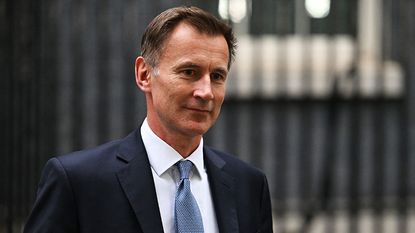Chancellor backtracks on dividend tax cut measures
Jeremy Hunt has reversed the cut to dividend tax announced in Kwasi Kwarteng’s mini-Budget – we explain what it means for investors.


The new chancellor, Jeremy Hunt, has scrapped his predecessor's plans to reduce the tax paid on dividends.
In his mini-Budget at the end of September, Kwasi Kwarteng announced that he would be rolling back Rishi Sunak’s plans to increase the basic rate of tax paid on dividends from 7.5% to 8.75%.
Hunt is going to stick with Sunak’s plans and keep the rate at 8.75%.
Subscribe to MoneyWeek
Subscribe to MoneyWeek today and get your first six magazine issues absolutely FREE

Sign up to Money Morning
Don't miss the latest investment and personal finances news, market analysis, plus money-saving tips with our free twice-daily newsletter
Don't miss the latest investment and personal finances news, market analysis, plus money-saving tips with our free twice-daily newsletter
The basic rate of dividend tax is paid by those investors who receive over £2,000 a year in dividend income.
History of the dividend tax
In 2016, the government announced a major shakeup in the way dividends were taxed. Before the changes, basic-rate taxpayers effectively didn’t have to pay anything on dividend income.
This approach was widely criticised for being unfair as investors could earn as much as £42,000 a year from dividend income without having to pay any tax at all. Higher rate taxpayers had to pay a rate of 25%.
Using this loophole, contractors using limited companies and company directors could pay themselves in dividends and essentially avoid tax altogether, as long as they stayed below the basic rate band of income tax.
That changed at the beginning of the 2016-2017 tax year.
Under the new regime, investors received a £5,000 dividend allowance with tax being due on any income over this amount. The tax-free dividend allowance was then reduced further to £2,000 in 2018, although any dividend income that falls within the personal allowance of £12,570 does not count towards the total. This does not apply to investments held within a Stocks and Shares ISA.
Before Kwarteng’s mini-Budget, the dividend tax rates stood as follows:
| Tax band | Tax rate on dividends over the allowance |
| Basic rate | 8.75% |
| Higher rate | 33.75% |
| Additional rate | 39.35% |
Following the tax cuts announced in the mini-Budget, rates were projected to fall back to last year’s level (1.25% lower across the board).
However, Hunt is going to scrap this change. Dividend tax rates will now remain at the levels in the table.
An easy win for the government
In the grand scheme of things, the dividend tax is not a big revenue generator, but it is a politically charged subject.
The Treasury estimates that keeping the 1.25% uplift will bring in around £1bn a year extra. That compares to the £915bn in total tax recipes in the 2021-2022 tax year.
Nevertheless, in 2019 the TUC and the High Pay Centre reported that just 1% of all taxpayers – those earning over £150,000 a year – pocketed 22% of UK dividend payments.
And there could be further changes to come to the dividend tax rate. Campaigners have long argued that dividend tax rates should be harmonised with income tax rates to narrow the gap between taxes on wealth and employment.
Raising the dividend tax rate to 20% would help narrow this gap, and once again, it could be one way for the government to raise funds without leaning on the average taxpayer. This could be an easy way to raise a couple of billion pounds a year and help the government argue that it’s trying to reduce income inequality.
The UK is already somewhat of an outlier when it comes to dividend taxes. The average dividend tax rate for European OECD countries is just over 23%, more than double the current basic rate here.
Rupert is the Deputy Digital Editor of MoneyWeek. He has been an active investor since leaving school and has always been fascinated by the world of business and investing.
His style has been heavily influenced by US investors Warren Buffett and Philip Carret. He is always looking for high-quality growth opportunities trading at a reasonable price, preferring cash generative businesses with strong balance sheets over blue-sky growth stocks.
Rupert was a freelance financial journalist for 10 years before moving to MoneyWeek, writing for several UK and international publications aimed at a range of readers, from the first timer to experienced high net wealth individuals and fund managers. During this time he had developed a deep understanding of the financial markets and the factors that influence them.
He has written for the Motley Fool, Gurufocus and ValueWalk among others. Rupert has also founded and managed several businesses, including New York-based hedge fund newsletter, Hidden Value Stocks, written over 20 ebooks and appeared as an expert commentator on the BBC World Service.
He has achieved the CFA UK Certificate in Investment Management, Chartered Institute for Securities & Investment Investment Advice Diploma and Chartered Institute for Securities & Investment Private Client Investment Advice & Management (PCIAM) qualification.
-
-
 Investment trust discounts hit 2008 levels. Here’s how to profit
Investment trust discounts hit 2008 levels. Here’s how to profitInvestment trust discounts have risen to levels not seen since 2008, here are three trusts looking to buy to profit.
By Rupert Hargreaves Published
-
 A luxury stock to buy at a high street price
A luxury stock to buy at a high street priceInvestors wrongly consider Watches of Switzerland a high-street outlet.
By Dr Matthew Partridge Published
-
 August NS&I Premium Bond winners unveiled - have you scooped £1m?
August NS&I Premium Bond winners unveiled - have you scooped £1m?Two lucky NS&I Premium Bond winners are now millionaires in the August draw. Find out here if you are one of them
By Tom Higgins Published
-
 Savings rates more than double in a year as challenger banks top the best buy tables
Savings rates more than double in a year as challenger banks top the best buy tablesThe best savings rates have doubled - and in some cases tripled - in a year, with challenger banks offering the highest rates. While they are still no match for inflation, we look at what you could be earning.
By Ruth Emery Published
-
 Midlife MOT: what is it and who can get one?
Midlife MOT: what is it and who can get one?The government has launched an online midlife MOT to help older workers with financial planning, health guidance and career skills. But how does it work, who can get one and would you pass it?
By Ruth Emery Published
-
 Coventry Building Society launches new best easy access savings account
Coventry Building Society launches new best easy access savings accountCoventry Building Society's deal tops our easy access savings account list, but could your cash be put to better use?
By Tom Higgins Published
-
 NS&I boosts fixed-term savings rates
NS&I boosts fixed-term savings ratesThe NS&I, the government-backed savings institution has mirrored recent rate rises seen elsewhere in the market.
By Tom Higgins Published
-
 Should you let AI give you financial advice?
Should you let AI give you financial advice?Can AI fill the financial advice gap? Kalpana Fitzpatrick looks at the pros and cons of using AI to guide your finances.
By Kalpana Fitzpatrick Published
-
 Small pension pots to be consolidated, says DWP
Small pension pots to be consolidated, says DWPWorkplace pension schemes worth less than £1,000 that become “deferred” when a saver changes jobs will be consolidated under a new system
By Ruth Emery Published
-
 Watchdog summons banks to explain paltry savings rates
Watchdog summons banks to explain paltry savings ratesSavings rates trail mortgage rates - and the financial watchdog has summoned banks to a meeting amid concerns of profiteering.
By Katie Binns Last updated









